UP IHR and University of the Cordilleras Co-Organize Two-Day Program on Human Rights Research and Training
From September 30 to October 1, 2024 UP Law Center Institute of Human Rights (UP IHR). together with the University of Cordilleras (UC), organized, the Training in Research and Teaching of Human Rights program where UP IHR lawyers shared their knowledge in their individual fields of expertise in human rights and technical skills in research to help strengthen the academe’s appreciation of both areas. The 2-day program was hosted by UC in Baguio City and was attended by more than 200 participants – faculty members, researchers, and students from various universities.
UP IHR Director Professor Elizabeth Aguiling-Pangalangan officially opened the 2-day program with an emphasis on the growing need for research and continuous education of the various aspects of human rights confronting not just the academe, but more broadly, individuals, on a daily basis and for a deeper understanding of human rights. Professor Aguiling-Pangalangan also provided an overview of the program with an introduction of each of the UP IHR lawyers and their expertise. Aptly concluding her remarks, Professor Aguiling-Pangalangan advanced collaboration with all fields of study to create a world where human rights are respected, protected, and fulfilled for all.
DAY 1
Day 1 of the program saw the attendance of researchers and members of the faculty from University of Cordilleras, Tarlac State University, Baguio State University, and Ifugao State University. UP IHR presented issues on human rights and possible fields of further research and provided participants with suggested learning activities for engaging their classes with respect to human rights.
UP IHR University Researcher Atty. James Gregory Villasis’ presentation entitled “Introduction to Human Rights in Criminal Justice: Learning Activities and Emerging Trends in Research,” provided a brief introduction to basic human rights principles in the context of criminal justice and an introduction to the Philippine Human Rights Framework and International Human Rights Treaties. Atty. Villasis’ presentation further featured contemporary and emerging issues in human rights and criminal justice that may be potential areas for research.
Following this, UP IHR Director Professor Aguiling-Pangalangan discussed the Rights of the Child through her presentation “Rights of the Child: Children as Victims, Children as Perpetrators.” The discussion highlighted the several instruments and special laws covering and affecting children’s rights such as the Convention on the Rights of the Child (CRC) and the Convention on the Elimination of All Forms of Discrimination Against Women (CEDAW) that highlights the crucial yet often challenging balance between protection and participation rights for children. Professor Aguiling-Pangalangan also delved into a comprehensive discussion on Philippine special laws and a regional comparative analysis of children’s rights in Southeast Asia; and an illustration of systemic challenges persisting in the role of law enforcement exacerbated by socio-economic influences in the involvement of Children in Conflict with the Law (CICL). Ending on a positive note, Professor Aguiling-Pangalangan shared optimistic news regarding the rehabilitation and reintegration of CICLs, with initiatives aimed at providing for their support and education.
The third presentation, “Sexual Crimes: Transformation in Human Rights Approaches,” by UP IHR Senior Legal Reform Specialist Atty. Daniel Lising M.D. provided a thought-provoking discussion on sexual crimes and focused on the evolution of human rights approaches and the critical intersection of human rights and gender justice. Atty. Lising traced the historical context of sexual crimes highlighting a shift from viewing women as property – where “crimes against chastity” were rooted in notions of ownership – to a contemporary understanding that recognizes autonomy and consent. Atty. Lising further presented statistics on adolescent pregnancy and noted that while the data is accurate in itself, disaggregating this data could offer deeper insights into the socio-environmental factors affecting the population. The discussion underscored how human rights issues contribute to its transformation into comprehensive legislation that advocates for a framework that respects human rights and promotes genuine gender equality.
The last presentation for Day 1, “Law Enforcement and the Rights of Indigenous Peoples,” was delivered by UP IHR Head Legal Officer Atty. Raymond Marvic Baguilat provided insight into the critical interactions between law enforcement and the rights of Indigenous Peoples (IPs) in the Philippines. Atty. Baguilat articulated the complexities of enforcing laws within the context of Indigenous rights, emphasizing the need for a legal regime that respects and integrates international standards protecting IPs; and highlighted the troubling phenomena of development aggression and red-tagging, where indigenous communities are often labeled as threats, undermining their rights and safety. Along with a presentation of suggested research areas on IPs and their rights, Atty. Baguilat encouraged a comprehensive approach to shed light on the legal challenges faced by IPs and their advocates.
During the open forum, researchers and academics sought further insights from the panel of the presenters on children’s rights and prevailing socio-cultural norms such as with regard to child labor practices and positive discipline. Participants also sought the guidance of the UP IHR on practical steps forward to becoming a similarly situated academic institution that is credible and impartial.
DAY 2
Day 2 of the program gathered almost 300 students from University of Cordilleras, Tarlac State University, Baguio State University, and Ifugao State University, along with Day 1 participants.
The first presentation, “Enforcing Human Rights,” was delivered by Atty. James Gregory Villasis. The presentation provided an overview and introduction to human rights enforcement and monitoring mechanisms both in the domestic and international levels. Atty. Villasis outlined the critical role of the Commission on Human Rights (CHR) as the National Human Rights Institution (NHRI) in the Philippines in promoting accountability and safeguarding rights; the extraordinary writs available to individuals in the legal system and their significance against human rights violations; and the role and limitations of various international bodies and their corresponding available mechanisms.
Second is the presentation “Human Rights-Based Policing in the Philippines: A Contextual Analysis” delivered by UP IHR Senior Legal Reform Specialist Atty. Glenda Litong. The compelling presentation is grounded on the internationalization of human rights principles and its translation into local law enforcement practices. Atty. Litong introduced and highlighted the need for guidelines that promote rights-based policing; and articulated the concept with regard to the current Philippine situation and the transformative potential it holds in fostering trust and cooperation between law enforcement and communities.
Lastly, Atty. Raymond Marvic Baguilat in his presentation, “Law Enforcement and Drugs,” traced the history of drug use and regulation in the Philippines from its pre-Hispanic conceptions to the contemporary alongside the evolution of human rights in drug policies. Atty. Baguilat emphasized the need to adopt a health-based approach, contrary to a penal approach, in addressing the negative impact and notions on drug use; and how the current policy framework continues to undermine the potential for compassionate and effective responses to drug-related challenges – that a shift towards a more human and rights-based approach to drug policy that prioritizes health and social integration can address this. Atty. Baguilat concludes his presentation with a call to action for participants to live by their oath and take to heart compassion for peoples and their human rights.
Day 2’s open forums raised, among others, questions with regard to balancing of cultural justice systems and law enforcement; the enforceability of extraordinary writs; and guidance on ensuring that proper literature and resources are used in curriculum development.
The 2-day program is part of UP IHR’s commitment to further human rights as an academic institution that responds to current social challenges and dynamic law-related issues while being firm in the imperative of upholding human dignity and integrity.

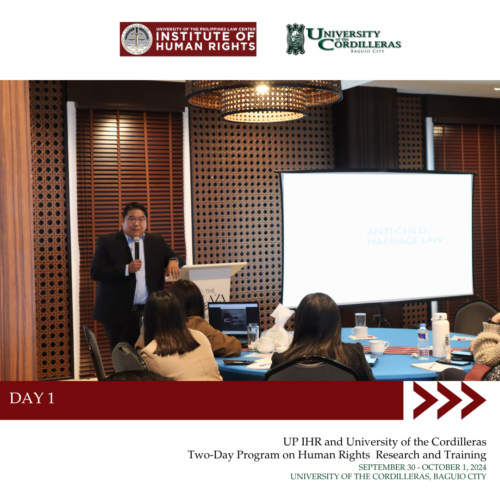
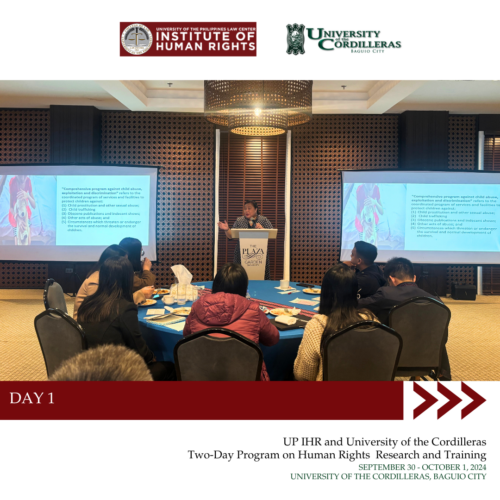
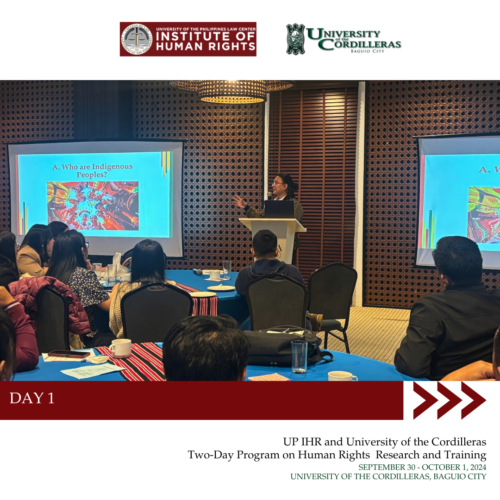
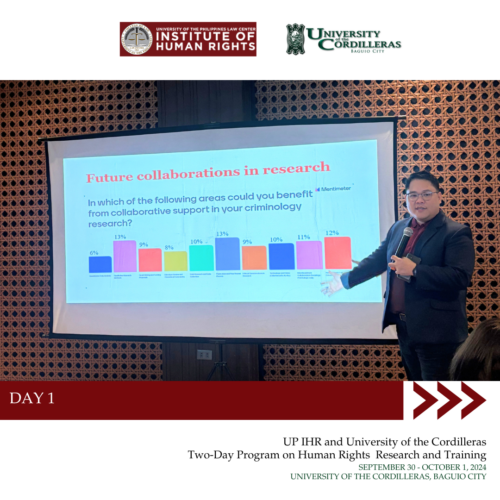
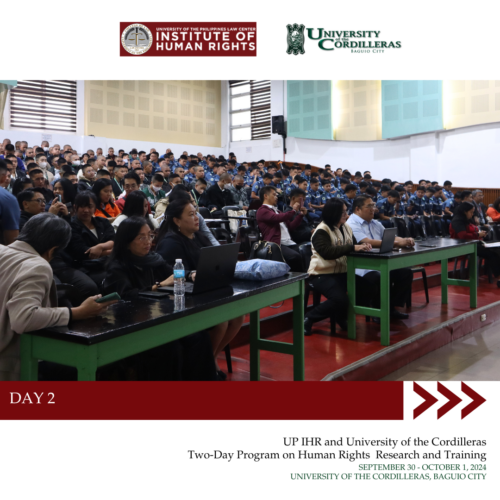
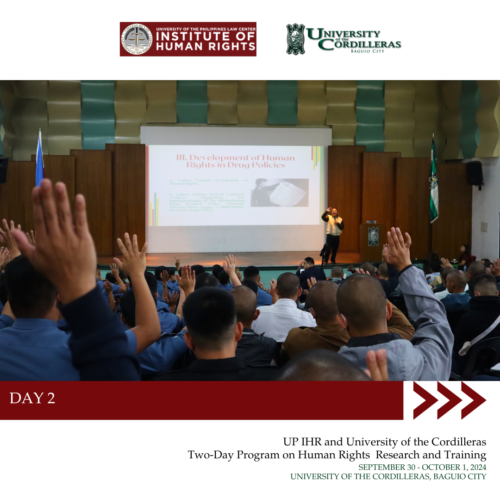
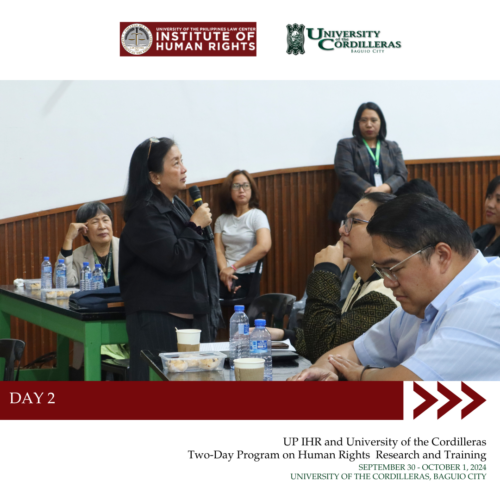
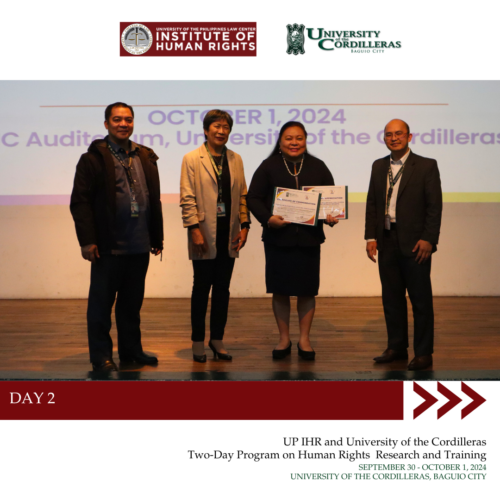






































































































 on the upper right corner to select a video.
on the upper right corner to select a video.